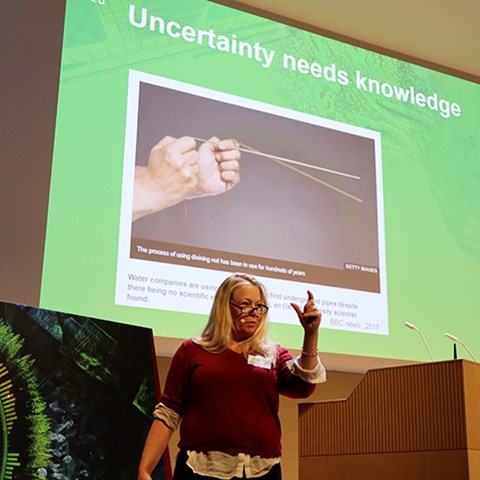Why do you choose to highlight the issue of water management?
Water management is critical for building climate resilience and food security. We have seen this again this year, not least in Sweden, with a severe early summer drought and then major problems with too much water in July and August. We want the crop to receive adequate water to guarantee the availability of food. But water availability is also important for many other aspects such as infrastructure and health.
What is water management?
Water management is the acquisition, use and exploitation of water resources in a sustainable manner. This may involve using water resources for agricultural production, but also for people, ecosystem services and other societal benefits. For agriculture, this often means managing water withdrawals for, for example, crop irrigation and water supply to animals. For agriculture, it is also important to ensure that the return flow of water is of good quantity and quality for downstream uses and for the maintenance of ecosystem services.
What challenges do we face globally in terms of water management in agriculture?
In comparison to the benefits we humans wish to derive from it, our fresh water is growing scarce. Greater demand for fresh water is being driven by both the production of healthier food for more people and the more irregular water availability brought on by climate change.
With rising temperatures and erratic rainfall, greater irrigation availability is needed. We also need to ensure good soil health and adapt crops to new temperatures and growing conditions. Even Sweden, where irrigation is now used on three to five percent of the land, may require greater water withdrawals. This became clear this spring when the first grassland harvest was very poor in southern Sweden, which led to a risk of feed shortages in parts of the country.
There are also threats to our fresh water. It is polluted and overexploited. This further limits the availability of water.
What are the solutions for better water management?
When there are challenges related to the availability and use of water, dialogue and knowledge are needed. It often requires innovation, which is the overarching theme of this year's SIWI World Water Week. The new challenges that arise in relation to water demand as climate, environment and society change require new solutions.
In our research, we see that new climate conditions will require new water solutions for agriculture, such as secured water supply in ponds and improved soil health, but also in the form of drainage to protect production conditions in good arable soil. We need knowledge about how these solutions can work effectively, and we need innovation that contributes to new management and investment models.
What more research is needed to improve water management globally?
In terms of water availability for agriculture, we need more research on how our water resource is distributed and available under a changing climate. We also need more research on how to use and manage water resources in a sustainable and climate-smart way. A large part of this is about using the water supply efficiently and improving its quality. It is also about how to control and allocate water resources using financial instruments and legislation.
Why is it important to talk about water managment?
Because water management is essential for food security under both current and new climate conditions. Moreover, for a long time we have taken the importance of water for our food production too lightly. Now we need to quickly improve our water security both in Sweden and globally and look at water storage from several perspectives. In the seminar, we presented ideas on how to manage water availability efficiently in different types of agricultural landscapes. The hope was to share knowledge and learn from each other.
